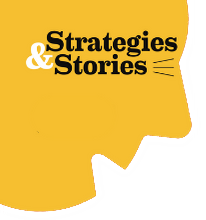Founders of startups mistakenly assume that they need to think about their messaging just before they are ready to pitch. We pitch when we are about to beg for something— funding, market, support, or a handful of other wants and needs.
We have to stop thinking about pitching, which we do near the end of our offering’s development, but think about story instead—and think about it and think about story from Day One. You story is most often the only thing that outsiders see— who you are, what you do, what you can do for others, and what you need. That embedded impression about you and your idea comes either from the story you tell them (which you control) or the story they surmise (which may not be accurate).
Creating a persuasive, clear message that conveys a basic foundation of the problem you are solving, the opportunity you are offering, what you can bring, and why your audience should care is every bit as important as anything else you will ever do. I have seen many-an-extraordinary, game-changing, gang-buster ventures falter or outright fail, not because the idea or business plan was unsound, but because the founders were unable to convince anyone else. The odds are stacked against a startup succeeding from the get-go, so without a compelling story, the likelihood of success diminish markedly—even further..
Sadly, I see some ventures put off crafting their presentation strategy (identifying stakeholders and the way to reach them), thinking they will address that chore when they are further along and ready to pitch. Pitch can wait until then, but you need a clear, compelling story from Day One. Four reasons:
- Market Validation. Unless your audience is clear about what you do, on the most basic level, you cannot expect to get accurate and useful customer/market validation. You data will simply be—less-than-accurate and possible not useful.
- The Nucleus of Who You Are. Your story is at the core of every conversation, communication, and message you deliver. It needs to be simple, clear, and not bog down others with technical detail that is better presented later or irrelevant information that is not only not-useful, but could distract or detract.
- Springboard for Your Own New Insights. As you articulate your story, you will have hear yourself saying something novel at the same time your audience hears it. In the process of constructing a story-to-tell-others, you are telling the story to yourself, improving your business plan, pivoting ideas.
- Being Ready When You Need to Be Ready. If you wait to create your story after you have developed your MVP, you will lose valuable time developing it (when you should already be out there pitching). More important, you will lose the ability to work out the bugs in advance—so you are not working them out in front of important audiences. Your story my well be your most important asset, and without it, the world will little know or care about what you have been doing.

